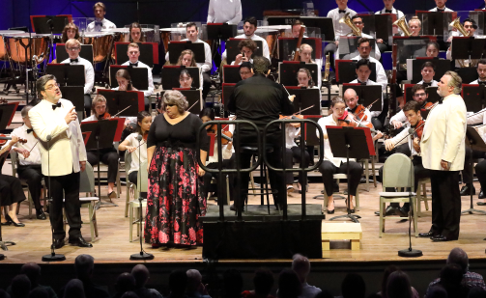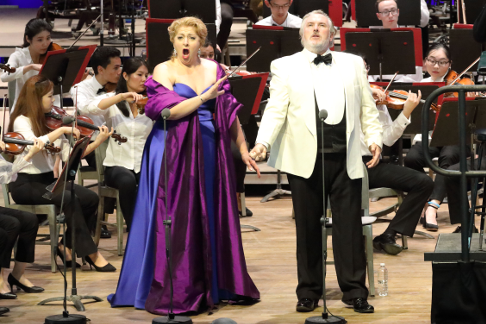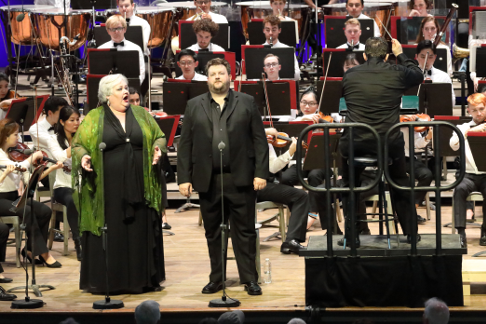![Amber Wagner as Sieglinde in the first act of Wagner's <em>Die Walküre</em> [Photo by Hilary Scott]](http://www.operatoday.com/Amber_Wagner.png)
05 Aug 2019
The Sopranos at Tanglewood
Among classical music lovers, Wagner inspires equal measures of devotion and disdain. Some travel far and sit for hours to hear his operas live. Others eschew them completely.
English Touring Opera are delighted to announce a season of lyric monodramas to tour nationally from October to December. The season features music for solo singer and piano by Argento, Britten, Tippett and Shostakovich with a bold and inventive approach to making opera during social distancing.
This tenth of ten Live from London concerts was in fact a recorded live performance from California. It was no less enjoyable for that, and it was also uplifting to learn that this wasn’t in fact the ‘last’ LfL event that we will be able to enjoy, courtesy of VOCES8 and their fellow vocal ensembles (more below …).
Ever since Wigmore Hall announced their superb series of autumn concerts, all streamed live and available free of charge, I’d been looking forward to this song recital by Ian Bostridge and Imogen Cooper.
Although Stile Antico’s programme article for their Live from London recital introduced their selection from the many treasures of the English Renaissance in the context of the theological debates and upheavals of the Tudor and Elizabethan years, their performance was more evocative of private chamber music than of public liturgy.
Evidently, face masks don’t stifle appreciative “Bravo!”s. And, reducing audience numbers doesn’t lower the volume of such acclamations. For, the audience at Wigmore Hall gave soprano Elizabeth Llewellyn and pianist Simon Lepper a greatly deserved warm reception and hearty response following this lunchtime recital of late-Romantic song.
For this week’s Live from London vocal recital we moved from the home of VOCES8, St Anne and St Agnes in the City of London, to Kings Place, where The Sixteen - who have been associate artists at the venue for some time - presented a programme of music and words bound together by the theme of ‘reflection’.
'Such is your divine Disposation that both you excellently understand, and royally entertaine the Exercise of Musicke.’
‘And there was war in heaven: Michael and his angels fought against the dragon; and the dragon fought and his angels, And prevailed not; neither was their place found any more in heaven … that old serpent … Satan, which deceiveth the whole world: he was cast out into the earth, and his angels were cast out with him.’
There was never any doubt that the fifth of the twelve Met Stars Live in Concert broadcasts was going to be a palpably intense and vivid event, as well as a musically stunning and theatrically enervating experience.
‘Love’ was the theme for this Live from London performance by Apollo5. Given the complexity and diversity of that human emotion, and Apollo5’s reputation for versatility and diverse repertoire, ranging from Renaissance choral music to jazz, from contemporary classical works to popular song, it was no surprise that their programme spanned 500 years and several musical styles.
The Academy of St Martin in the Fields have titled their autumn series of eight concerts - which are taking place at 5pm and 7.30pm on two Saturdays each month at their home venue in Trafalgar Square, and being filmed for streaming the following Thursday - ‘re:connect’.
The London Symphony Orchestra opened their Autumn 2020 season with a homage to Oliver Knussen, who died at the age of 66 in July 2018. The programme traced a national musical lineage through the twentieth century, from Britten to Knussen, on to Mark-Anthony Turnage, and entwining the LSO and Rattle too.
With the Live from London digital vocal festival entering the second half of the series, the festival’s host, VOCES8, returned to their home at St Annes and St Agnes in the City of London to present a sequence of ‘Choral Dances’ - vocal music inspired by dance, embracing diverse genres from the Renaissance madrigal to swing jazz.
Just a few unison string wriggles from the opening of Mozart’s overture to Le nozze di Figaro are enough to make any opera-lover perch on the edge of their seat, in excited anticipation of the drama in music to come, so there could be no other curtain-raiser for this Gala Concert at the Royal Opera House, the latest instalment from ‘their House’ to ‘our houses’.
"Before the ending of the day, creator of all things, we pray that, with your accustomed mercy, you may watch over us."
The doors at The Metropolitan Opera will not open to live audiences until 2021 at the earliest, and the likelihood of normal operatic life resuming in cities around the world looks but a distant dream at present. But, while we may not be invited from our homes into the opera house for some time yet, with its free daily screenings of past productions and its pay-per-view Met Stars Live in Concert series, the Met continues to bring opera into our homes.
Music-making at this year’s Grange Festival Opera may have fallen silent in June and July, but the country house and extensive grounds of The Grange provided an ideal setting for a weekend of twelve specially conceived ‘promenade’ performances encompassing music and dance.
There’s a “slide of harmony” and “all the bones leave your body at that moment and you collapse to the floor, it’s so extraordinary.”
“Music for a while, shall all your cares beguile.”
The hum of bees rising from myriad scented blooms; gentle strains of birdsong; the cheerful chatter of picnickers beside a still lake; decorous thwacks of leather on willow; song and music floating through the warm evening air.
![Amber Wagner as Sieglinde in the first act of Wagner's <em>Die Walküre</em> [Photo by Hilary Scott]](http://www.operatoday.com/Amber_Wagner.png)
Among classical music lovers, Wagner inspires equal measures of devotion and disdain. Some travel far and sit for hours to hear his operas live. Others eschew them completely.
New Englanders are no different. The audience for last weekend’s concert performance of Die Walküre at the Tanglewood Festival seemed somewhat smaller than usual – filling over half the outdoor venue. Yet those present listened with rapt attention throughout and rose in an immediate standing ovation, whooping and hollering, after each act.
The adulation was deserved. This was the most emotionally moving – and, in some respects, musically satisfying – performance of this work I have witnessed in several decades. This is a tribute, above all, to the world-class cast of singers, led by three leading Wagnerian ladies.
The most memorable performance came from the youngest of the three: Oregonian Amber Wagner. Not since the great Austrian soprano Leonie Rysanek retired the role of Sieglinde thirty-five years ago have I heard anyone approach the character with such a combination of power and emotion.
 Franz-Josef Selig (Hunding), Amber Wagner (Sieglinde), Simon O’Neill (Siegmund), Nelsons, and TMCO in Act I of Die Walküre
Franz-Josef Selig (Hunding), Amber Wagner (Sieglinde), Simon O’Neill (Siegmund), Nelsons, and TMCO in Act I of Die Walküre
In this era of ever smaller dramatic voices, the astonishing size of Wagner’s voice must be experienced live to be believed. Her command ranges from a girlish yet perfectly focused tone to a massive all-enveloping forte that effortlessly surrounds thousands in a sprawling open-air venue. And, just when one thinks she has reached her limit, she expands the voice further and soars rapturously through musical climaxes.
Singing all out in this way would exhaust most singers, yet Amber Wagner has resources left over to balance power with subtle expression. Sieglinde is perhaps most passionate and sympathetic character in all Wagnerian opera: a battered woman in a forced marriage who, one night deep in the forest, unexpectedly encounters the only person in the world perfect for her. Together they experience the only moments of bliss either will ever know.
Amber Wagner inhabits the extremes of Sieglinde’s trauma and ecstasy with heartbreakingly vividness and vulnerability, yet also finds ways to animate even seemingly insignificant lines – for example, the questions she poses to Siegmund – as if her life depended on it. Throughout Wagner retains a mezzo-like warmth appropriate to this woman of flesh and blood.
One caveat: Wagner does occasionally push her voice too hard. As a result, a few high notes drift sharp and many low phrases begin with a bark akin to a vocal fry. These are odd and (apparently) unnecessary blemishes in a singer so naturally endowed with vocal heft. Banish them and she could be, incontestably, the greatest Sieglinde of the early 21st century.
 Christine Goerke (Brünnhilde) & Simon O’Neill (Siegmund) with the TMC Orchestra
Christine Goerke (Brünnhilde) & Simon O’Neill (Siegmund) with the TMC Orchestra
The other leading soprano, Christine Goerke, has emerged in the last few years as America’s go-to Brünnhilde, singing the role in Chicago, Houston and, just this spring, at the Met. Whereas Amber Wagner was born with a large and heavy voice, which she spent ten years refining from the bottom up, Goerke has a more lyric instrument, which she has been expanding in size and extending downwards. Beginning a quarter century ago, she enjoyed considerable success in Handel, Mozart and Gluck, then lost that ability as her voice deepened, and recently reemerged as a full-fledged dramatic soprano. If she still lacks the overpowering mass or the silvery edge of some Brünnhilde voices, she compensates with rock-solid technique, plush elegance, and sparklingly clear diction.
Above all, Goerke is an artist of refreshingly heartfelt emotionality. She communicates, facially and vocally, each step in Brünnhilde’s painful transformation from a naïve tomboy to a rebel willing to defy paternal authority for love. Even she seemed to wipe a few tears from her eyes as the final chord died away.
Veteran mezzo-soprano Stephanie Blyth portrayed Fricka, Wotan’s haranguing spouse. Like Amber Wagner, her penetrating voice is a physiological marvel: a massive mezzo with tenor-like low tones that approximate the (today nearly extinct) true contralto timbre. These days she is not, however, given to singing softly, gently or introspectively, so her characterization of Fricka highlights the vengeful anger of a wronged wife far more than the underlying love and loss that motivate it.
Even the famous “Ride of the Valkyries,” with its chorus of eight warrior-maidens, was luxury cast. Top emerging artists sang alongside those with long resumes in leading roles. Especially impressive in the latter category was the clarion yet musical Gerhilde of Kelly Cae Hogan, who has herself portrayed Brünnhilde at major European venues. They raised the roof.
 Stephanie Blythe (Fricka) and James Rutherford (Wotan) with Andris Nelsons and TMCO
Stephanie Blythe (Fricka) and James Rutherford (Wotan) with Andris Nelsons and TMCO
While not quite reaching the heights of their female counterparts, three distinguished male singers added some more fine moments. British bass-baritone James Rutherford does not command the full range of Wotan’s heroism (at the top of the voice) or gravity (at the bottom). Yet he compensated by interpreting some passages unusually softly, often to great musical and dramatic effect – as in a heartbreakingly understated account of “Wotan’s Farewell.”
New Zealand-born tenor Simon O’Neill sang Siegmund with uniformly ringing and perfectly supported tone, enthusiastically extending the high notes. His is an intrinsically lighter voice, without the baritonal tinge needed to convey the character’s loneliness and brooding introspection. While elegant and honest, the result remained slightly monochromatic.
Veteran German bass Franz-Josef Selig has sung in top venues worldwide. He presented a solid, well-enunciated Hunding, even if he failed to convey the full brutality and masculine entitlement of this hulking tribal chieftain.
The Tanglewood Music Center Orchestra, comprised of instrumental players aged under 20, played with elegance, enthusiasm and – a few brass bloopers late in the day aside – precision. Particularly lovely were the violas, cellos, clarinets and oboes. To be sure, the sound sometimes lacked the warm veneer of a top pit band. Still, it is a testament to the extraordinary wealth of instrumental talent in the world today that such an ensemble of students can play this well, even though surely few (if any) had ever encountered this challenging score.
On the podium, BSO chief conductor Andris Nelsons cued with clarity while sensitive to instrumental detail. Still, some parts of the score (Act I especially) seemed to lack a bit of overarching architectural unity – perhaps not surprising under the circumstances.
This Die Walküre was a concert performance. Wagner himself famously himself believed that his Der Ring des Nibelungen was multi-media art: he constructed the Bayreuth Festival Theater in order to support an utterly immersive staging. Yet seeing this opera in concert with a cast as expressive as this one, spaced over 24 hours, is a remarkably satisfying experience.
Stripping away the myriad distractions of sets, costumes, technological razzle-dazzle and modern directorial concepts encourages singers to act with their faces and voices, drawing the audience more into their intimate grief and joy. Even the rambunctious Valkyries have an opportunity be genuinely fun-loving sisters – an effect that usually seems a bit ridiculous on a massive stage. Moreover, individual orchestral instrumentalists, which in Wagner often express unspoken emotions, are clearly visible – something O’Neill used to particular effect, gazing at a cello or trumpet as it read his thoughts.
This reminds us that, underneath the mythological overlay of gods and magic, Die Walküre is opera on a human scale. It rests on a series of personal dialogues among family members: an incestuous sister and brother, an unfaithful husband and wife, a stepsister and brother and, at its heart, a loving but increasingly dysfunctional father and daughter. All this came through last weekend with a power and honesty one rarely experiences on the opera stage today.
Andrew Moravcsik
Cast and production information:
Amber Wagner, soprano (Sieglinde); Christine Goerke, soprano (Brünnhilde); Stephanie Blythe, mezzo-soprano (Fricka); Simon O'neill, tenor (Siegmund); James Rutherford, bass-baritone (Wotan); Franz.Josef Selig, bass (Hunding); Jessica Faselt, soprano (Helmwige); Wendy Bryn Harmer, soprano (Ortlinde); Kelly Cae Hogan, soprano (Gerhilde); Eve Gigliotti, mezzo-soprano (Siegrune); Dana Beth Miller, mezzo-soprano (Grimgerde); Ronnita Miller, mezzo-soprano (Schwertleite); Mary Phillips, mezzo-soprano (Rossweisse); Renee Tatum, mezzo-soprano (Waltraute). Andris Nelsons, conductor. Tanglewood Music Center Orchestra.